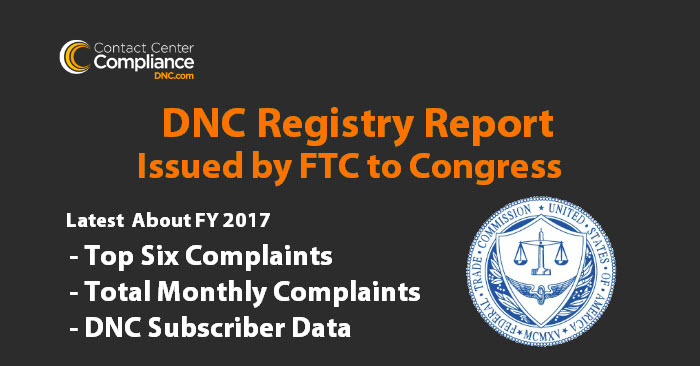The Federal Trade Commission published its biennial report to Congress focused on the use of the National Do Not Call (DNC) Registry by both consumers and businesses and other organizations over the past two years. The report provides a summary of the current operations of the Registry, the Registry’s impact on new telecommunication technologies, and the impact of the established business relationship exception from FTC enforcement efforts.
Overview
In February of 2008, Congress passed the Do Not Call Registry Fee Extension Act of 2007, requiring the FTC to produce a biennial report on the National Do Not Call Registry. The first report was issued in 2009 and then every two years thereafter. The following are highlights from the Biennial DNC Registry Report to Congress for FY 2017.
DNC Registry By The Numbers:
- 3.8 million new phone numbers were added in FY 2017
- 229 million active registrations
- Over 18,000 Registry subscribers (sellers, telemarketers, and exempt organizations)
- 2,259 subscribers paid access fees totaling more than $12.6 million
Top Six Categories of Consumer Telemarketing Complaints:
- Reducing Your Debt (credit cards, mortgage, student loans)
- Dropped Call or No Message
- Vacation & Timeshares
- Warranties & Protection Plans
- Fraudulent Calls (calls pretending to be government, businesses, or family and friends)
- Medical & Prescriptions
Report Highlights
1. Five-Year Re-Registration Requirement
When the DNC Registry was first implemented in 2003, registrations were scheduled to expire after five years. In 2008, Congress passed the Do Not Call Improvement Act of 2007 which eliminated the automatic removal of phone numbers from the Registry. At the time of its passage, no registrations had yet expired. Consequently, no consumers ever had to re-register their numbers.
2. New Telecommunications Technology
The FTC continues to track how technology affects the Registry and the consumers and telemarketers who access it.
In 2017, reports of “neighborhood” caller ID spoofing increased. Consumer complaints about illegal calls—especially robocalls—have increased significantly.
- In the fourth quarter of 2009, the FTC received approximately 63,000 complaints about illegal robocalls each month.
- That number has more than quintupled. In FY 2017, the FTC received an average of more than 375,000 robocall complaints per month.
- In the year since August 1, 2016, the Federal Communications Commission, which also regulates telemarketing and robocalls, received nearly 185,000 complaints.
The FCC is currently conducting a rulemaking proceeding in which it is considering ways to enable the blocking of illegal robocalls by voice service providers. Another FCC rulemaking proceeding focuses on how to facilitate the authentication of a call’s originating phone number, as a way to defeat deceptive caller ID spoofing.
3. Number Portability and Abandoned Telephone Numbers
FCC regulations allow people who change service providers in the same geographic area to retain their phone number. In order to maintain data integrity of the Registry, the FTC developed procedures to identify which numbers to remove.
The only numbers removed from the Registry are those that have been disconnected (or abandoned) and then reconnected to a different account holder at a different address. A maintenance process is performed monthly to ensure that numbers which have been ported are not removed, but numbers that truly have been abandoned are deleted.
Conclusion
The report also indicates that the FTC is tracking new direct marketing technologies and analyzing how they have led to an increase in DNC related consumer complaints. They continue to work closely with industry groups, academic experts, and counterparts at federal, state, and international government bodies to encourage the development of new technologies and telecommunications standards to combat illegal calls. This includes encouraging private industry, other government entities, academia, and other interested parties to work towards solutions and create new strategies.
Even with all the attention and technological advancements, problems still persist between the DNC Registry and the business community. While most businesses follow the required DNC regulations, it doesn’t mean they are shielded from being hit with surprise lawsuits. The real problem has been the court’s interpretation of the regulations. Unfortunately, businesses following the rules in “good faith” are often the primary targets of frivolous TCPA and DNC lawsuits.
The real violators are unlawfully operated businesses that ignore the regulations and use caller ID spoofing or conduct high volumes of pre-recorded messages using robocalls which can be conducted without significant expense. These illegal operations continue to evade the FTC and other law enforcement agencies. The problem for honest telemarketers is that they are the low hanging fruit for predatory attorneys and serial litigators looking to file TCPA and DNC lawsuits.
Until law enforcement agencies can eliminate the “bad players” it is important for call centers to do everything in their power to stay off the radar of regulators and serial litigators who are looking for quick settlements from honest calling mistakes. One way of sparing your business the aggravation of an expensive TCPA lawsuit is to preemptively scrub contacts that are more likely to instigate a TCPA lawsuit against your business.
